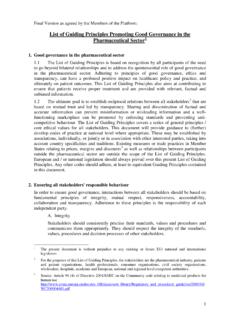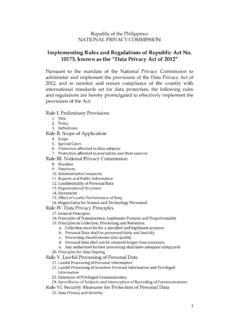Transcription of The new EU Regulation on the protection of personal data ...
1 The new EU Regulation on the protection of personal data : what does it mean for patients? A guide for patients and patients organisations 2 The new EU Regulation on the protection of personal data : what does it mean for patients? C on ten ts 1. Introduction .. 3 Why data protection rules matter for patients with chronic and long term conditions .. 3 Why a new Regulation ? .. 4 When will it apply? .. 5 Important concepts in data protection .. 6 2. How are patients health and genetic data protected by the EU legislation? .. 7 General principles .. 7 In which circumstances can patients health and genetic data be processed? .. 8 Rules for consent .. 10 Zoom on what it means .. 11 3. What are the rights provided by EU law to patients regarding their data ? .. 13 4. Key areas to monitor in the implementation of the Regulation .. 17 exemptions to patients rights in research.
2 17 Other provisions that could impact patients rights .. 18 ensuring patients voice is heard in data protection debateS .. 19 What about when patients organisations are collecting, using, and sharing patients data for advocacy purposes? .. 20 5. Conclusions .. 21 6. Resources .. 22 3 The new EU Regulation on the protection of personal data : what does it mean for patients? In May 2016, the European Union adopted a new Regulation (EU) 2016/679 on the protection of personal data . The European Patients Forum has actively advocated for a balanced approach to protect patients privacy while ensuring patient s data can be shared for healthcare and research purposes since the publication of the proposal for a Regulation in 2012. The final Regulation provides more rights to citizens to be better informed about the use made of their personal data , and gives clearer responsibilities to people and entities using personal data .
3 This document outlines what this new legislation means from a patients perspective and how patients organisations can contribute to ensuring that patients rights to privacy, data sharing, and accessing their health data are implemented optimally. WHY data protection RULES MATTER FOR PATIENTS WITH CHRONIC AND LONG TERM CONDITIONS Patients fundamental right to protection of their health data is an important issue in diverse contexts such as healthcare, including care given through eHealth or in a cross-border healthcare context, and research (clinical trials, clinical investigations, epidemiological research, patient ). On the one hand, health and genetic data belong to the category of sensitive data , and benefit from additional protection in EU law. Unauthorised disclosure of personal health information could negatively impact on an individual patient s personal and professional life.
4 What is personal data ? personal data is information about a particular natural person that allows, or could allow identifying the person. It is important to distinguish between identifiable data (even if it is key coded) and data that is rendered completely anonymous, as the Regulation applies to the former, and not the later (Recital 36). It may be any information relating to an individual, whether it relates to his or her private, professional or public life. To be covered by the Regulation the data need to be collected and used by someone else (a person or legal entity). 4 The new EU Regulation on the protection of personal data : what does it mean for patients? On the other hand, the processing of health data is fundamental for the good functioning of healthcare services, for patients safety, and to advance research and improve public health. Patients organisations are also gathering and using patients data in their advocacy or research activities.
5 So being able to use patients personal data is sometimes important to advance research, healthcare practices or patients rights. For the reasons above it is important that patient organisations are aware of the rights of patients in this area and engage in order to ensure that the patients perspective on data sharing, consent and data privacy are taken into account in healthcare and research. It is patients data , patients health and patients privacy that are at stake. WHY A NEW Regulation ? New technologies are offering a wealth of opportunities to collect, use and share health data more efficiently, to empower patients in managing their diseases, for research, and to improve the quality, safety, and efficiency of healthcare systems. But they pose new challenges for privacy and data security. In 2015, a special Eurobarometer on data protection showed that most citizens did not feel in control of what happens to their data The new Regulation seeks to address this by empowering citizens with more rights and information.
6 1 Special Eurobarometer 431 on data protection , June 2015 : Whenever issues linked to data protection are under discussion it is all too easy to get distracted from the one simple point that attracted us to the discussion in the first place: the fact that there are many millions of patients across Europe who have unmet health needs. New treatments are only going to come from medical research and the use of patient data will play a crucial role in this. Nick Meade, Genetic Alliance UK 5 The new EU Regulation on the protection of personal data : what does it mean for patients? Currently the Directive on general data protection of 1995 is in application until the new Regulation is implemented. it has contributed to harmonising data protection rules in the European Union. However, a new Regulation was necessary to take into account the changes triggered by new technologies, such as the increasing use of internet and electronic means in healthcare and telemedicine.
7 While the Directive is not directly applicable in Member States who had to adopt provisions in the national law to comply with it which gives way to more difference in interpretation from one country to another the Regulation will apply directly to Member States. Apart from specific exceptions in the text of the Regulation where Member States are allowed to adopt further measures, the same provisions apply across the EU. This can be positive for example to facilitate cross border research and cross border healthcare. WHEN WILL IT APPLY? The new Regulation will apply from 28 May 2018. data protection : A fundamental right The Charter of Fundamental Rights of the European Union has established the right to protection of personal data as a fundamental right in its Article 8. It means that everyone has the right to protection of data concerning him or her and that processing* must be fair, for specified purposes and on the basis of the consent of the person concerned.
8 Another important part is that it gives people the right to access data concerning themselves and have incorrect information rectified. *See page 5 (definition of processing) 6 The new EU Regulation on the protection of personal data : what does it mean for patients? data processing: any operation performed on personal data such as collection, recording, organisation, structuring, storage, adaptation, retrieval consultation, use, disclosure by transmission, making available or disseminating, erasure, destruction. data subject: The person the data is about. For example, patients are data subject when their personal data are processed for healthcare or research purpose. The Regulation also grants rights to data subjects in order to protect their personal data . data controller: the persons or entities (whether public or private) which collect and process personal data . They determine the purpose(s) and means for processing the data .
9 For instance, medical practitioners are usually controllers of their patients' data . IMPORTANT CONCEPTS IN data protection Below are some important terms you need to know to understand the EU data protection legislation2: 2 Processing and controller are also defined more formally in the Regulation see article 4 (2) and (7) 7 The new EU Regulation on the protection of personal data : what does it mean for patients? GENERAL PRINCIPLES The data protection Regulation sets clear principles that apply to all use of patients data and to all data controllers. These principles, defined in Article 5, are important because if they are disregarded by a data controller, the use they make of the data is not lawful. They must always be respected by all data controllers: Principle What does it mean? Lawfulness, fairness and transparency data has to be processed in accordance with the European Union and Member State laws, data controllers have to be transparent with patients regarding what happens to their personal data .
10 Purpose limitation The data has to be collected for a specific explicit and legitimate purpose and cannot be used for other purposes beyond that. It is, however, considered that further processing for scientific research, archiving or statistical purposes is not incompatible with this principle. So data can be re-used for research. data minimisation It means that data controller should only ask patients information that is needed and relevant for the purpose for which they are collecting data . Accuracy Controllers have to ensure that their data is accurate. If it is not, the controller should take every reasonable step to rectify it. Limited storage data can only be stored for a limited period, except for archiving and scientific research purposes. Integrity and confidentiality data has to be processed in a manner that minimises risks to confidentiality and integrity of the data (which means ensuring its consistency and accuracy, as opposed to data corruption).






